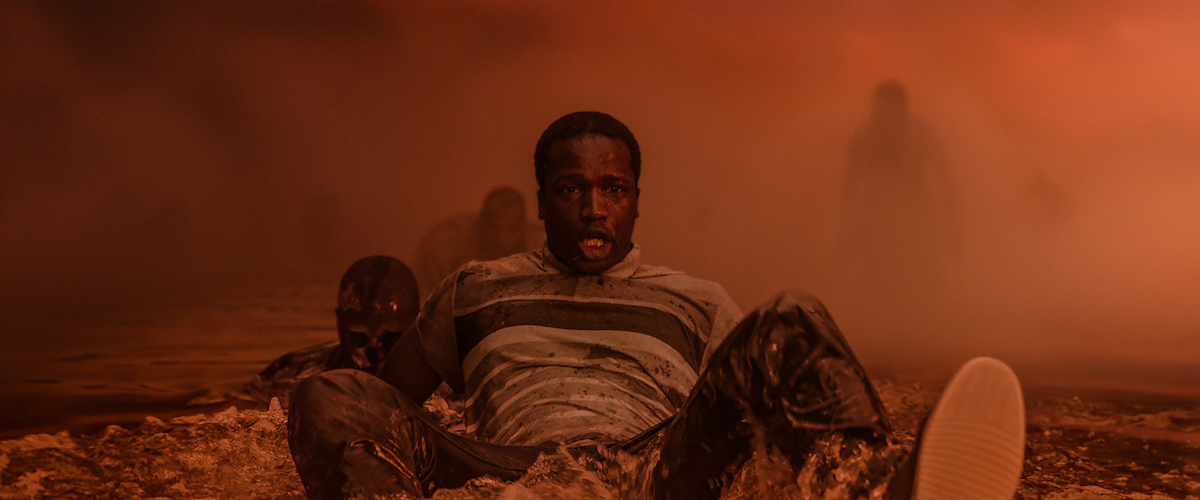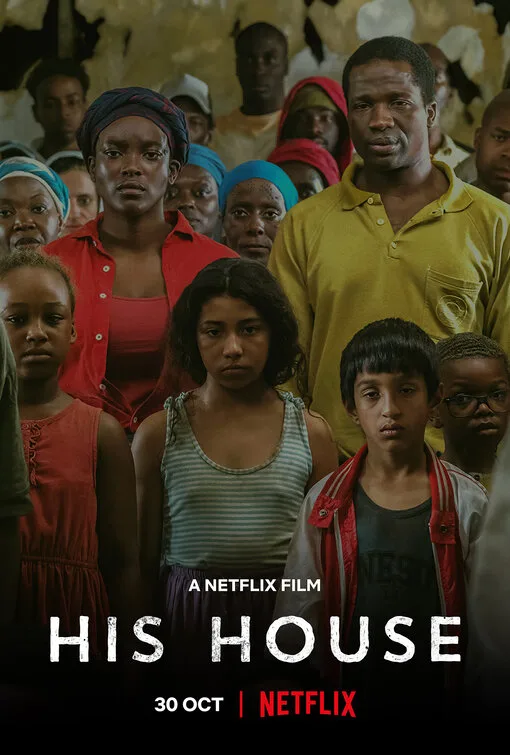At the center of Netflix’s ghost story “His House” is a marriage haunted by shared trauma. Writer/director Remi Weekes makes this symbolic connection clear, albeit somewhat comically, in the first scene. Bol Majur (Sope Dirisu) awakens from a nightmare to find his wife Rial (Wunmi Mosaku) cradling his head. “What were you dreaming about?” she asks. Bol tells a little white lie, the harmless kind that couples often use to avoid a more potentially fraught truth-telling. He tells her his dream was about their wedding day. “That explains all the screaming,” she replies.
The Majurs are refugees from South Sudan who escaped in the tragic boat accident shown in Bol’s nightmare. Their daughter drowned during the crossing. After being detained for a period of time, Bol and Rial are released “on probation” to a house in an unnamed English city (when Rial asks someone if she is in London, the answer is noncommittal). It’s implied that a house like this, in disrepair and crawling with vermin, is a typical government rental for people like the Majurs. Their case worker Mark (Matt Smith) and his cronies keep stating that this particular house is bigger than their own houses, their voices hinting at a dark sense of entitlement. More blatant is Mark’s repeated mantra that his newest reports should “be one of the good ones” and assimilate as quickly as possible.
“One of the good ones” is uttered multiple times in “His House,” giving the sense that this type of microaggression will be at the forefront of the film’s haunting. But Weekes relegates it to the background, keeping it in the corners of reality rather than informing the supernatural. Instead, these ghosts are symbolic stowaways on the migration. Their refusal to go back from whence they came is as adamant as Bol’s yearning to stay in England. Unlike him, they do offer a scenario for their acquiescence.
Bol repeatedly tells his wife that they are not going back. His desire to fit in results in him using an advertisement on a clothing store wall as the basis of his new fashion look. We catch a security guard following Bol in that store, a callous reminder of Rial telling her husband that full acceptance will never be possible. She sees this when some Black British teens who scream for her to “go back to Africa” after she asks them for help. The boys prove that old adage that not all skinfolk is kinfolk.
Though supportive of Bol’s attempts to get along, Rial’s feelings about her current situation are more complex. At a doctor’s appointment, she explains the markings on her skin as the symbols of both warring tribes in her homeland. The enemy symbols she carved herself, not just as a means of protection, but also as a physical manifestation of her sense of not belonging anywhere. Still, at the height of the Majurs’ terror, Rial is willing to do what the mean Black Brits she encountered suggested. As a result, Bol’s attitude becomes as ominous as the specters who visit every night.
“His House” wastes little time in bringing about things that go bump (and worse) in the night. It doesn’t play coy with the details because it never questions whether everything is in Bol’s mind—Rial can also see and hear what they refer to the “sea witch” living with them. Weekes subverts our plot expectations for the genre in a scene where Mark visits their home after Bol pays a troubling visit to his office. Seeing the house in massive disrepair due to Bol attacking its walls with a hammer the night before, Mark demands an explanation. Normally, characters in horror movies would try to downplay or deny that which is causing their madness. Instead, Rial nonchalantly tells Mark that there’s a witch in the house.
Dirisu and Mosaku give excellent performances with subtle nuances that make them credible as a married couple. Because they have been through so much, they are able to talk to one another about their uncomfortable circumstances. They experience the haunting differently—Bol’s visions are far more visceral and visual while the witch converses with Rial. Both see and hear their deceased daughter, however. “Do you want to know what she tells me?” Rial asks Bol. “She says that I should be afraid of you.” Later, when Bol tries to shield his deepest fears from his wife, as he had attempted to do in the opening scene, Rial calls him a liar. Mosaku hits the word with a force as scary as the creatures that keep popping up.
The special effects here are genuinely unsettling. There are the expected jump scares, but they’re just appetizers for what happens after they goose us. The metaphors for drowning are evident, but there are also visions of zombie-like creatures and the sea witch itself. Though this isn’t very gory, the intensity level is impressive in the haunting scenes, so much so that, at one point, I caught myself watching through my fingers. The sound design also deserves mention, because a haunted house is only as good as its noises, creaks, and moans.
Just when we think we know where the story is going, and that we understand its characters and the source of their trauma, “His House” takes an unexpected turn that casts one of its protagonists in a different light. It’s the one time where reality becomes even more disturbing than any supernatural element, muddying the waters on how we feel about everything that has come before. It also makes us consider our desire for retribution, then upends it with an act which shows that we are outsiders who will never fully comprehend neither the shared pain of the Majurs nor what they were willing to do for survival and for love. We are left with the sobering notion that trauma will always occupy a room in the houses our psyches build. To not acknowledge its presence only makes it bang harder on the walls.
Now playing on Netflix




















